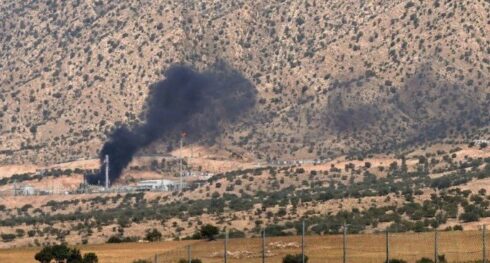Originally published by IslamicWorldNews
Recent drone attacks on oilfields in the Kurdistan Region of Iraq have disrupted oil production and infrastructure, intensifying political and economic tensions between the central government of Iraq and the Kurdistan Region.
These drone attacks illustrate the complex political, economic, and security issues stemming from the ongoing tensions between Baghdad and Erbil. One significant attack occurred near Erbil International Airport, which prompted a response from American defense systems stationed in the area, resulting in the destruction of the attacking drone.
In addition to the incident near Erbil Airport, drone strikes targeted oilfields operated by Norwegian companies DNO and American Hunt Oil in the Zakho and Sheikhan regions. These attacks led to the temporary halting of oil production in some fields, reportedly reducing the region’s overall production by 145,000 barrels per day—approximately half of its daily output.
Origins and Reasons for the Attacks
Although no specific group has claimed responsibility for the attacks, many Iraqis believe they are rooted not only in internal disputes among various Iraqi political factions but also stem from broader conflicts concerning the region’s economic and strategic interests. Some analysts suggest that these drone strikes may be part of a strategy aimed at pressuring the Kurdistan Region to accept new oil agreements with the central Iraqi government.
This theory gained traction following the announcement of a new oil agreement between Baghdad and Erbil, which significantly reduces the region’s share of oil revenues. After this agreement, the frequency of drone attacks on oilfields decreased, indicating that the groups behind the attacks might have targeted these fields to coerce Erbil into accepting the new terms.
Political Reactions and Consequences
In response to the attacks, Iraqi Prime Minister Muhammad Shia al-Sudani initiated a comprehensive investigation and urged security authorities to identify the perpetrators as quickly as possible. He also stated that decisive measures would be taken against those responsible, reflecting the Iraqi central government’s strong concern for the security and stability of the region, which is one of the country’s primary sources of income.
Conversely, the Iraqi Resistance Coordination Committee, which consists of various resistance groups, claimed that these attacks are a “settling of internal scores” between the Kurdistan Regional Government and oil companies. The committee denied any involvement in the drone attacks, asserting that their operations have never harmed the interests of the Iraqi people or security forces. They advised the Kurdistan Regional Government to concentrate on improving citizens’ livelihoods and addressing economic challenges instead of transferring its internal crises onto the central government.
Economic Concerns and the Future of Oil Production
The significant decline in oil production in the Kurdistan Region, along with extensive damage to its oil infrastructure, has led officials to call for more robust defense measures to protect these fields. The head of the Kurdistan Region’s Foreign Relations Office has stated that the United States is deeply concerned about these attacks. Consequently, various requests have been made to strengthen the defense systems of both the Kurdistan Region and all of Iraq.
The drop in oil production and the damage to the region’s strategic oil fields have adversely impacted its revenues and raised concerns about the economic future of the Kurdistan Region. Reports indicate that the monthly oil revenue, which is approximately $297 million, is at serious risk due to the production being cut by half. This revenue constitutes a significant portion of the region’s budget. If the attacks and continued decline in production persist, the economic situation in the Kurdistan Region may be severely affected.
Iran: A Possible Reason for These Attacks
The recent drone attacks on oil fields in the Iraqi Kurdistan Region may also serve a strategic purpose for Iran. These security pressures could be Iran’s way of signaling that if the Kurdistan Region becomes a base for military and intelligence operations conducted by Israel and its proxy groups—particularly the Kurdish groups that act against Iran’s interests—then Erbil’s oil and economic resources will be subject to significant attacks and restrictions. This stance reflects Tehran’s concern regarding the increasing anti-Iranian influence in the Iraqi Kurdistan Region and suggests that any alignment by the Kurdistan Region with U.S. and Israeli objectives could lead to severe economic and security repercussions.
Given the region’s heavy reliance on oil revenues, the escalation of drone attacks on oil wells and infrastructure not only poses a grave threat to Erbil’s economy but also sends a clear warning to regional and international actors: Tehran can use oil as a leverage tool to limit the influence of Israel and its Western allies in northern Iraq.
In summary, this warning from Iran indirectly calls on the Kurdistan Regional Government to reconsider its regional policies. It emphasizes that to maintain economic stability and security, the Kurdistan Region should refrain from engaging in or facilitating anti-Iranian activities within its territories. Otherwise, the oil economy of the Kurdistan Region could sustain serious damage that would be difficult to repair.
The drone attacks on the oil fields of the Iraqi Kurdistan Region should be viewed not only through the lens of military and security motives but also as part of a broader conflict in domestic and international politics. These attacks are clearly connected to the oil agreements between Baghdad and Erbil, as well as political developments within Iraq. Thus, the Iraqi central government should closely monitor the security and economic situation in the Kurdistan Region to prevent escalation. Simultaneously, the Kurdistan Region should avoid exacerbating internal tensions and crises to safeguard its security and interests while pursuing diplomatic and economic solutions to its ongoing challenges.
MORE ON THE TOPIC:







the thieving amerikunts have been stealing iraq’s oil and giving it to the jooz via snake erdogan for the past 20 years. kick out the thieving amerikunt oil companies.